
I was looking at the photo I took of the Aqsa Masjid in Jerusalem. It is one of my favorite photos from my trip. The sky looks amazing, and it was an amazing day being in this holy place, where many of the prophets (pbut) once lived and stood. The spiritual energy was still in the air even today. I was thinking to myself that I had yet to read about the story of the Aqsa mosque and how it related to the Prophet Mohammad (saaws). I had heard the story from many Muslims, and as most Muslims I know believe that he actually prayed there on his magical night journey to Jerusalem from Mecca. I had actually read what was written about this in the Quran when I read the Quran all the way through but had not truly reflected on it until now.
I remembered right away that when I was thinking about where this story was in the Quran that it I would most likely find it again in Surat Al-Isra, because Isra is the word my Muslim friends used when referring to the prophet's (pbuh) night journey.
Here is what I read there about it in Surah Al-Isra:
Exalted is He who took His slave for a journey by night from Al Masjid Al-Haraam to Al Masjid Al-Aqsa, the neighborhood whereof We have blessed in order that We might show him of our Ayat (proofs, evidences, lessons, signs, etc.). Verily, He is the Al-Hearer, the All-Seer. [Qur'an 17:1]
Subhana allathee asra biAAabdihi laylan mina almasjidi alharami ila almasjidi alaqsa allathee barakna hawlahu linuriyahu min ayatina innahu huwa alssameeAAu albaseeru
سُبْحَانَ الَّذِي أَسْرَى بِعَبْدِهِ لَيْلاً مِّنَ الْمَسْجِدِ الْحَرَامِ إِلَى الْمَسْجِدِ الأَقْصَى الَّذِي بَارَكْنَا حَوْلَهُ لِنُرِيَهُ مِنْ آيَاتِنَا إِنَّهُ هُوَ السَّمِيعُ البَصِيرُ (17:1)
So clearly our prophet (pbuh) did take a miraculous night journey to Al-Aqsa Masjid from Mecca. Some people might leave it at this, but not me of course. I thought to myself, you know? In Christianity, there is so much focus on "the church." Either insinuating the Vatican where they supposedly have intercession powers for all Christians (Catholics) and have power in dictating doctrine within the religion. Then there is the church in the sense that that is where one goes to worship, and that a Christian is not necessarily a good Christian unless he regularly attends church. Yet, I thought to myself always as a child, is Church any holier than any other place? What makes it holy? I actually loved attending church because it was a chance for believers to come together and pray and worship together and motivate each other and bring tithings and learn from the scriptures. I especially loved the bible studies. But all of these things can happen anywhere really. At someone's home or in the park for example. It is not restricted to a church building.
This is also true with regards to Judaism and Synagogues. They are not restricted to the synagogue, any place can be a place of worship or prayer. Yet, although this is true, I often felt as though the emphasis on the church as a bit over the top. The real church is the actual people.
At any rate, with regards to Islam, I was excited when I first began to consider Islam because I felt there was less emphasis on the building and more on the inward dedication to Allah. The first image that would pop into my head about Islam would not be someone in church clothes walking to church on a Sunday, it would be someone just praying in prostration to Allah. The very first image I see is that.
As for the mosques, I was thinking to myself, hey wait a minute, was Aqsa Masjid really there during the life of the prophet (pbuh)?? It looked old, but still.... Hmmm.... I felt a bit guilty that I was even asking myself this, but I felt like even hard questions we should ask ourselves if we really want to reflect as Allah asks us to.
The holy Quran says that the prophet went to the "farthest mosque," and people say this is referring to the mosque in Jerusalem that is now called "Al-Aqsa," which actually means "The Farthest." So when Allah is saying that he travelled to Al Aqsa, He is saying he traveled to the farthest. It wasn't called Al-Aqsa in the prophet's (pbuh) time however, it was called more similar to what the Jews had called and what it was known as in Abraham's time (Beteyel in Hebrew meaning House of Allah, or also known as Bet Ha-Miqdash) and in Arabic; Bait Al Maqdis, House of Holiness.
Additionally, he mentioned it was a place that was blessed in a special way. What other place can you think of other than Mecca that has a special blessing upon it? The holy city of course, Jerusalem! As for the problem with the mosque not existing yet, or did it? Depends on your choice of words. The word "masjid" is commonly used today to refer to the building shaped like a dome with a little crescent moon on top where Muslims go to worship. But is that what it actually means? All Arabic words have roots, and when we look at this root sa-ja-da (to prostrate), and it was said in Al-Sihah: Masjad with a fathah refers to one's forehead which is the place involved in prostration. So the word masjid means a place where one prostrates. I know there is more to it than that, but with my limited knowledge that is all I can share about it at this point but it is very fascinating so I encourage you to use this to look into it further yourself.
As I was saying, since it actually just means a place of prostration or worship to Allah, then of course the surah still makes complete sense whether there was an actual building there or not. However, there are hadeeth that support that there was a mosque built by that time and that Caliph Umar used to go into it as well. Also, it is known to have existed even in King Solomon's day (pbuh) and that he built it alongside the temple in the name of Allah. It is also said to go even further back, to Abraham's time, named by God as a holy place of worship, and maybe even further than that. What is interesting to me about this other than the obvious reasons, is how something that at first might seem like something soooo separate from Christianity or Judaism when they look at the mosque in Jerusalem, yet if it was actually built by the same prophets all three groups believe in it shows how we are all of the same faith in the same God. So this mosque is actually a symbol of the link between all of us. It is a holy place of worship. Established by our forefathers in the faith.
So it is likely that their was an actual mosque in some form, maybe not exactly as it is structured today, but there was something, according to many scholars. However, the point is not what the building looked like, even if it looked exactly as Aqsa looks now, or if it was totally different, more or less extravagant, bigger or smaller.
You see, my point in this post is that it is not important whether there was a building. Islam is not about a building, it is about our worship and obedience of Allah. So even if people want to claim that the story is a total myth, they should think twice because the Quran is from Allah and all that is from Allah is good, and the prophet Mohammad (pbuh) would have been able to pray in Jerusalem no matter what Aqsa Mosque looked like at the time. Just an interesting thing to point out on the side, not all Muslims pray in mosques as we know them today actually, back in history and even today in some places in the world.
There is a very nice linguistic, scholarly study on this topic that you can read for further inspiration at: http://www.islamic-awareness.org/Quran/Contrad/External/aqsa.html
Some information from this article:
In 49-50 AH / 670 CE, Bishop Arculfus, a Christian visitor in Jerusalem, reported:
2. What Is A Masjid?On the famous place where once stood the temple, the Saracens worship at a square house of prayer, which they have built with little art, of boards and large beams on the remains of some ruins...[2]
We will begin by dealing with the word masjid from both the linguistic and legal points of view. The Arabic word for "mosque" is masjid. Discussing with the word masjid from a linguistic point of view al-Zarkashi says:
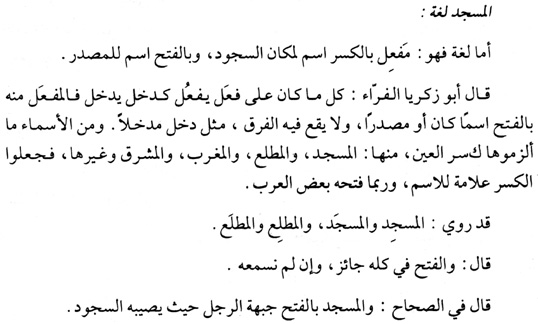
![]()
Masjid from a linguistic point of view
The Prophet's night journey was from "the inviolable place of worship" (al-Masjid al-Haram) to "the farthest place of worship" (al-Masjid al-Aqsa). The former is certainly located in Makkah, but what about the latter? The reference to Allah blessing its surroundings (... whose precincts We did bless) suggests a location in the "Holy Land" (cf. 21:81; 7:137; 34:18). Neal Robinson states:
The [Muslim] tradition which identifies it [i.e., al-Masjid al-Aqsa] with the Temple Mount in Jerusalem makes admirable sense in view of the fact that the 'place of worship' (masjid) whose destruction is evoked in v. 7 [i.e., 17:7] is clearly the Temple.[4]
Surah Al-Isra 17:7 - If ye did well, ye did well for yourselves; if ye did evil, (ye did it) against yourselves. So when the second of the warnings came to pass, (We permitted your enemies) to disfigure your faces, and to enter your Temple as they had entered it before, and to visit with destruction all that fell into their power.
This view is also shared by many western scholars.[5]
As it was mentioned earlier that masjid refers to a place of prostration without any religious distinction; an excellent example of the usage of the word "masjid" referring to a non-Islamic sanctuary can be seen in the verse 17:7. The verse describes briefly the destruction of the masjid in Jerusalem (i.e., the Temple) by the enemies of Children of Israel.

Since prostration is the most honourable act in prayer because of the nearness of the servant to his Lord, the name of the location was derived from it. This is why we call it masjid [location of sujud / prostration] and not marka` [place of ruku` / inclination].[7]
In summary, masjid from a linguistic point of view means a "place of prostration" without any religious distinction. From a legal point of view the word masjid in shari`ah constitutes every place on earth that is fit for prostration. In other words masjid does not designate a building but only a "place of prostration"; the place may or may not have the building.
Therefore, no one can claim that the word "masjid" in the Islamic terminology refers necessarily to a building.
Prostration is not restricted to any particular place of the earth. It may also be a metaphor of a construction built for prayer. This is due to the fact that once prayer is authorized everywhere on earth it becomes like a mosque for that purpose. Ibn al-Tin said: "The earth has been made for me a masjid and a means of purification" both were given to the Prophet, peace be upon him, while it was only a place for worship for others and was not a means of purification, because Jesus used to walk around and pray whenever prayer was due.
Before we close this issue, one should realize that verse 17:1 also speaks of "The Sacred Mosque" which is in Makkah around the Ka`bah. Did a building for the mosque exist there in the time of the Prophet? The answer is that the Ka`bah was there but there was no building for the mosque. This further adds to the argument that the word masjid in this verse refers to a place of performing the prostration and does not imply the presence of a "building" in the modern understanding.
The above understanding of the word masjid as a place of worship not building per se is also well supported by archaeological and historic evidence. Below we present a picture of an early mosque in a place called Besor in Occupied Palestine.[10]
![]()
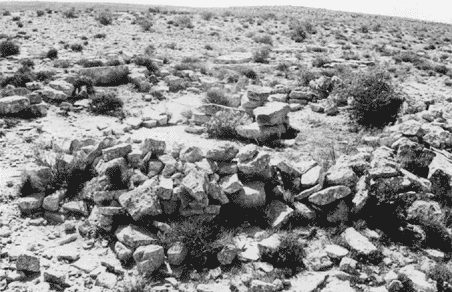
Figure 2: Besor masjid
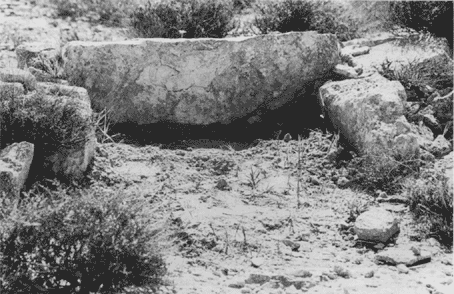
Figure 3: Besor mosque, The Qiblah
Moshe Sharon comments about the Besor mosque. He says:
To the west of the village on the top of the hill, overlooking the valley and the houses of the village, was the threshing floor, and to the south of it a small open mosque with a rectangular mihrab made of 3 blocks of stones [bottom figure]. The mosque was built to a height of probably two layers of stones, no more than 0.5 m., and was almost square, about 3 x 3 m. and could contain no more than 8-10 men at a time.[11]
There are many other examples of early mosques from Negev region that are nothing but a few stones arranged to mark the mihrab.[12,13]
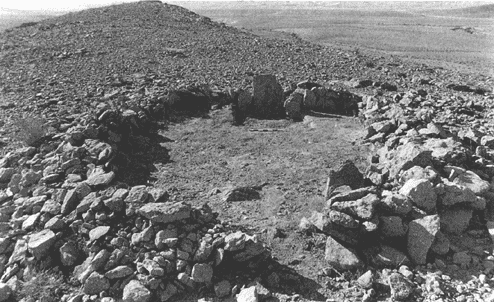
Figure 4: Mosque at Nahal Oded with the upright stone showing the direction of the qibla.
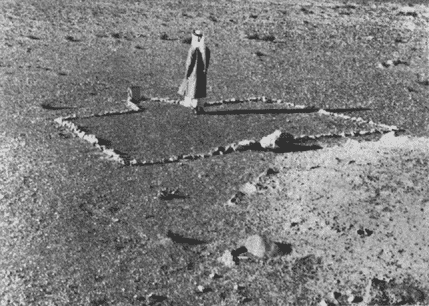
Figure 7: Modern Bedouin open mosque in Transjordan
It is clear from the above pictures that a mosque is simply a place where Muslims prostrate in prayer.
Concerning early mosques, Creswell states:
... their [i.e., Muslims'] architectural resources, before they started in their career of conquest, were barely enough to give expression to their needs. In other words Arabia constituted an almost perfect architectural vacuum... The first mosques in the great hiras, or half nomadic encampments of the conquest, such as Basra, Kufa and Fustat, were primitive in the extreme, and in Syria the first mosques were churches that had been converted or merely divided: In fact there is no reason for believing that any mosque was built as such in Syria until the time of al-Walid (705-15) or possibly `Abd al-Malik (685-705), for over a generation the Arabs remained quite untouched by any architectural ambitions...[14]
It is worth noting that the Prophet disliked extravagance and impressive architecture in buildings, especially mosques. The relative simplicity of early mosques is in fact a historical example of how the Prophet's Companions diligently followed his wishes. This is true to a greater extent even today.
3. Al-Masjid Al-Aqsa: A Place Of Prostration For JewsThe Qur'an refers to al-Aqsa as a masjid, a place of prostration. Was this place used for prostration in early times?
Al-Masjid al-Aqsa and the surrounding area (i.e., Dome of the Rock among others) is usually identified with the place where the Temple of Solomon once stood. Bet ha-Miqdash, as the Temple is usually known in Jewish literature, was primarily a place of assembly for the entire people, for purposes of sacrifice, prayer, and thanksgiving. It is in the prayer ritual that prostrations were performed by the priests. Encyclopedia Judaica provides an interesting account of the prayer ritual by the priests of the Temple.
The priest who had gathered the coals entered the sanctuary first, scattered them over the incense altar, prostrated himself, and departed. Then the priest who was chosen by lot to offer the incense entered, bearing the pan of incense in his hand. He was accompanied by a priest appointed for this task who instructed him in the proper ritual, and he did not offer it until he was told: "Offer the incense!" The officiating priest waited until the space between the hall and the altar was cleared of people, offered up the incense, prostrated himself, and departed (Tam. 6; Kelim end of ch. 1). During the offering of the incense in the sanctuary, the people used to gather in the azarah for prayer, and even outside the Temple these times were set aside for prayer (cf. Luke 1:10; Judith 9:1). After the departure of the priest who had offered the incense, all the priests filed into the sanctuary, prostrated themselves, and went out again.[15]
It is interesting to note that the Temple was considered as the only place of prostration by some Rabbis and that they would refuse to completely prostrate outside the Temple in Jerusalem.[16]
The Jewish concept of worship has extensive vocabulary, out of which hishtahawah, "to prostrate oneself," is the most frequently used in the Hebrew Bible (86 times).[17]
4. Yet Another Problem!In the same article, the missionaries express another objection:
In Yusuf Ali's commentary on this verse we read: "The Farthest Mosque must refer to the site of the Temple of Solomon in Jerusalem..." So, it is interpreted to be not the building itself, but only the site, the location where it had been. I might be wrong, but this seems to be contradicted by a hadith and Muhammad's understanding that Al-Masjid-ul-Aqs-a is something that is built, not just a location. Al-Masjid-ul-Haram after all was a building.
Beautiful portion of a hadith....
Sahih Bukhari, Volume 4, Book 55, Number 636:
Narrated Abu Dhaar:
......."Wherever the time for the prayer comes upon you, perform the prayer, for all the earth is a place of worshipping for you."
Abraham supposedly (re)built the Kaaba, (and Abraham lived about 2000 BC) and the Temple was built by Solomon in about 958-951 BC.
They identify the Farthest Mosque with the Temple of Solomon without further justification, and point out an error that they had invented themselves. Let us for example see what Imam Ibn Hajar says about this hadith in Fath al-Bari:
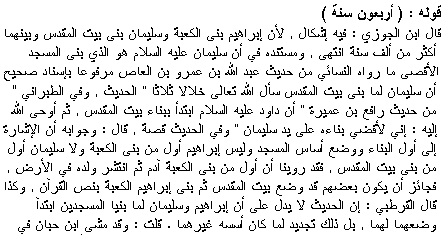
His saying (40 years)
Ibn al-Jawzi said: It raises a problem since Abraham built the Ka`bah and Solomon built Bayt al-Maqdis [another name of al-Masjid al-Aqsa cf. Hebrew Bet ha-Miqdash] and there are 1,000 years between them. His evidence for saying that it is Solomon - peace be upon him - who built the Farthest Mosque is the narration of al-Nasa'i from the hadith of `Abd Allah Ibn `Amr Ibn al-`As attributed to the Prophet with an authentic isnad that "When Solomon built Bayt al-Maqdis he asked God the Most High for three things etc." and in al-Tabarani from the hadith of Rafi` Ibn `Umayrah that "David - peace be upon him - started building Bayt al-Maqdis but God inspired him: I shall accomplish its building with Solomon" and the hadith has a story. He [Ibn al-Jawzi] said: "The answer to that is that the mention concerns the first construction and the foundation of the mosque and it is not Abraham who built the Ka`bah for the first time nor is it Solomon who built Bayt al-Maqdis for the first time. Indeed, we have narrated that the first one who built the Ka`bah is Adam. Then his progeny spread out on earth. Therefore, it is possible that one of them built Bayt al-Maqdis. Later, Abraham (re)built the Ka`bah according to the Qur'an." Likewise, al-Qurtubi said: The hadith does not indicate that Abraham and Solomon were the first ones to build the two mosques. It was only a renovation of what had been founded by others.[18]
After quoting other opinions, Ibn Hajar insists :
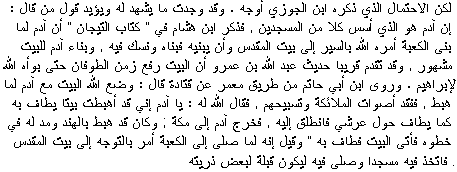
But the possibility mentioned by Ibn al-Jawzi is more pertinent. And I found evidence supporting those who say that it is Adam who founded both mosques. For instance, Ibn Hisham mentioned in "Kitab al-Tijan" that when Adam built the Ka`bah, God ordered him to walk to Bayt al-Maqdis and build it and so he did and offered worship in it. And the construction of the House [Arabic: al-Bayt, i.e., the Ka`bah] is famous and we have mentioned earlier the hadith of `Abd Allah Ibn `Amr that the House was elevated in the time of the flood until God showed Abraham its location. Ibn Abi Hatim narrated from the way of Ma`mar from Qatadah: God founded the House with Adam when he descended. But Adam missed the voices of the Angels and their prayers. Therefore, God told him: I sent down a House around which [people] will revolve like it is revolved around my Throne, so set out to it. Adam set out to Makkah - He had descended in India, and his steps were enlarged until he reached the House and revolved around it. It was also said that when he had prayed at the Ka`bah, he was ordered to set out to Jerusalem where he built a masjid [mosque] and prayed therein so that it became a qiblah to a part of his progeny.[19]
In summary, the verse 17:1 refers to the holy locations in Jerusalem and Makkah because they are blessed regardless of the type of mosque at the time of the heavenly trip of Prophet Muhammad. From an Islamic point of view, evidence has been given by eminent Muslim scholars like Ibn Hajar and Ibn al-Jawzi showing that it was Adam who built both mosques for the first time and that the job of Abraham and Solomon was only a renovation/reconstruction of these sanctuaries.
5. ConclusionsThe word masjid from a linguistic point of view refers to a place of prostration without any religious distinction. From a legal point of view the word masjid in shari`ah constitutes every place on earth that is fit for prostration.
The verse 17:1 From an Islamic point of view, evidence has been given by eminent Muslim scholars like Ibn Hajar and Ibn al-Jawzi who have discussed the issue. They have shown that it was Adam who built both mosques for the first time and that the duty of Abraham and Solomon was only a renovation/reconstruction of these sanctuaries.
And Allah knows best!
Further Reading
Arda Wiraz Namag (Iranian "Divina Commedia") And The Prophet's(P) Night Journey
It can also be argued that it was Islam that restored the sanctity of Temple Mount, and made it a place of prostration and prayer, but I'll leave that topic for another post.....
Thanks to the web site for pooling together these hadith and this research. I hope it was a source of education for those who visit my blog and I hope you will read the full article. Just click on the link and I encourage your own research as well.
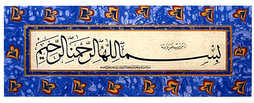



No comments:
Post a Comment